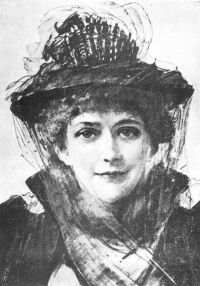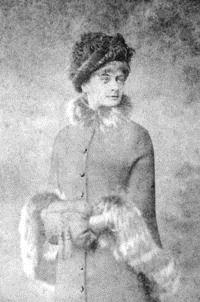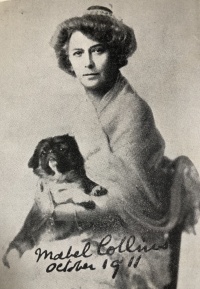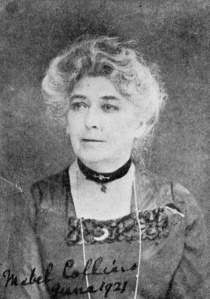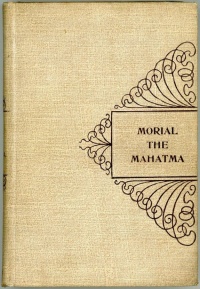Mabel Collins: Difference between revisions
Pablo Sender (talk | contribs) |
Pablo Sender (talk | contribs) No edit summary |
||
| Line 26: | Line 26: | ||
== Other activities == | == Other activities == | ||
[[File:Mabel Collins | [[File:Mabel Collins - 1911.jpg|right|200px]] | ||
Before encountering [[Theosophy]], Mabel became a renowned medium. In later years, however, she opposed [[Spiritualism]] vigorously. Her experiences at the séances, both as a medium and as part of the circle, led her to believe that the practice was highly dangerous; a view that agreed with that of [[H. P. Blavatsky]] and her [[Masters of Wisdom|Masters]]. | Before encountering [[Theosophy]], Mabel became a renowned medium. In later years, however, she opposed [[Spiritualism]] vigorously. Her experiences at the séances, both as a medium and as part of the circle, led her to believe that the practice was highly dangerous; a view that agreed with that of [[H. P. Blavatsky]] and her [[Masters of Wisdom|Masters]]. | ||
| Line 33: | Line 33: | ||
== Writings in periodicals == | == Writings in periodicals == | ||
[[File:Mabel Collins June 1921.jpg|left|210px|thumb|Mabel Collins in June, 1921]] | |||
The [[Union Index of Theosophical Periodicals]] lists more than 230 articles under the name [http://www.austheos.org.au/cgi-bin/ui-csvsearch.pl?search=mabel+collins&method=exact Mabel Collins], including those she wrote, reviews of her writings, and excerpts from her popular books. These are some examples: | The [[Union Index of Theosophical Periodicals]] lists more than 230 articles under the name [http://www.austheos.org.au/cgi-bin/ui-csvsearch.pl?search=mabel+collins&method=exact Mabel Collins], including those she wrote, reviews of her writings, and excerpts from her popular books. These are some examples: | ||
Revision as of 23:03, 21 September 2020
Mabel Collins (September 9, 1851 - March 31, 1927) is the name under which Mrs. Keningale Cook published her many writings. She was an English Theosophist, and author of at least 46 books, including Light on the Path, a perennial favorite among Theosophists.
Early life and education
Minna Mabel Collins was born on September 9, 1851 at St Peters Port, Guernsey. She "liked to refer to herself as a 'Nine' because she was the ninth child and was born on the ninth day of the ninth month."[1] Her parents were Edward James Mortimer Collins, a self-taught poet and journalist, and Susanna Hubbard, a merchant's daughter. When they married, Mortimer was nineteen years younger than his wife, who already had six children. The family moved frequently, as Mortimer repeatedly overspent and landed in debtors' prisons. "By the time she was twelve years old Minna had begun to write romances and verse herself. She had never attended school – what education she had was from her father. Poetry and philosophy formed the main content of her lessons."[2]
Marriage
Young Minna began a new life when she married Keningale Robert Cook on August 3, 1871 at St. Peters Church in Knowl Hill. He was six years older than she, and was well educated at Rugby and Trinity College in Dublin. He earned several degrees culminating in a Doctorate in Laws in 1875. During the years at Trinity College he was employed by the Post Office dealing with money orders, but by 1875 he had become a stockbroker in London. He published a book of poetry and numerous articles for the magazine Woman. This same magazine began to publish Minna's writings as well. "Almost every issue contained Minna’s or Robert’s writings. They covered a range of subjects but were primarily concerned with education, the role of women and the arts."
Her married life was not happy. She felt bored, and once remarked that on embarking into married life she felt her brain was atrophying. By February 1885 the Cooks' marriage had failed, and the couple separated. Robert died in June 1886, leaving her enough money to be able to live comfortably for a few years.[3]
Working with H. P. Blavatsky
Mabel had been introduced to Theosophy in 1881, when their neighbor Isabelle de Steiger loaned Robert a copy of H. P. Blavatsky's first book Isis Unveiled. Mabel became a regular visitor of the Sinnetts on Tuesday afternoons, and became a member of the London Lodge in 1884. Previous to her Theosophical connections she had written the book The Idyll of the White Lotus, a manuscript of which was shown to H. S. Olcott, then visiting Europe with Blavatsky. Olcott met Mabel, who told him the book was written either in trance or under dictation by an unseen character. The book was dedicated "To the True Author, the Inspirer of this work."
Blavatsky came to London for a visit and met Mabel on November 8, shortly before returning to India. According to Blavatsky, they met on two or three occasions during the autumn of 1884, always in the presence of others. It was in this year that Mabel wrote her book Light on the Path, which would become a Theosophical classic.
When Blavatsky moved to England in 1887, she stayed at "Maycot", a small cottage in Norwood owned by Mabel, who shared her home with Blavatsky. The two women created the monthly journal Lucifer in September 1887 and worked together as editors until February 1889 when she resigned.
Light on the Path Controversy
In 1889, Prof. Elliott Coues sought to discredit Madame Blavatsky in his May 11, 1889, article published in the The Religio-Philosophical Journal, by using as evidence an unsigned and undated note purportedly sent by Mabel Collins in 1885. He had inquired about the authorship of the Collins work Light on the Path. The note claimed that the Mahatmas inspired the writing of the book.[4] He also published a later letter in which Mabel claims her first answer was written at Blavatsky's dictation, and added that, to her knowledge, the book was not inspired by anyone, but that she saw the rules written on the walls of a place she visited spiritually. She went on to claim she had never received proof of the existence of any Master.
Blavatsky quickly and vigorously disputed Coues in a letter to Light, written June 1, 1889,[5] claiming that she had only briefly seen Mabel while in London a few times, and never in private. Also, she claimed that at the time this meeting was supposed to happen, she had already returned to India.[6]
Other activities
Before encountering Theosophy, Mabel became a renowned medium. In later years, however, she opposed Spiritualism vigorously. Her experiences at the séances, both as a medium and as part of the circle, led her to believe that the practice was highly dangerous; a view that agreed with that of H. P. Blavatsky and her Masters.
Mabel Collins was also known for her work for animal rights and her campaign against vivisection. She founded the Incorporated Parliamentary Association for the Abolition of Vivisection, which was registered as a corporation on February 22, 1907.[7]
Writings in periodicals
The Union Index of Theosophical Periodicals lists more than 230 articles under the name Mabel Collins, including those she wrote, reviews of her writings, and excerpts from her popular books. These are some examples:
- "Pensées," a long-running series of reprints in Le Lotus Bleu.
- "In the New Forest." The English Illustrated Magazine (June, 1885). Illustrated.
- "Thoreau: Hermit and Thinker." The Dublin University Magazine (November, 1877).
- "In a Corner of Bohemia." Tinsley's Magazine, Volume 24-26. Book published serially.
- "Love Is More Than Life." Home Chimes (1885). Book published serially.
- The Blossom and the Fruit: The True Story of a Magician was another book published serially in Lucifer in 1888.
She also wrote numerous articles for the magazine Woman, as did her husband.
Books
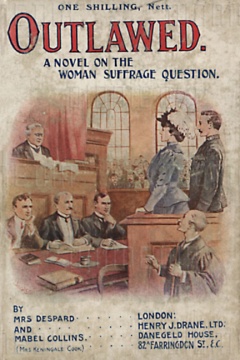
Mabel Collins wrote at least 46 books. These are the English-language titles according to the [8], listed here by publication date:
- The Blacksmith and Scholar. 1875.
- An Innocent Sinner; a Psychological Romance. London: Tinsley Bros., 1877. Available online at Google Books.
- Our Bohemia. London: Tinsley Brothers, 1879.
- In This World: a Novel. London: Chapman and Hall, 1879. Available online at Google Books.
- Too Red a Dawn. London: Tinsley Brothers, 1881.
- Cobwebs. London: Tinsley Brothers, 1882. Also printed with subtitle "Tales."
- In the Flower of Her Youth. A Novel.. London: F. V. White & Co., 1883. Available online at Google Books.
- Idyll of the White Lotus (1884). Advertised as "an occult story." Numerous editions. Available online at Google Books. The author claimed to have created this book by automatic writing, dictated by the Master Hilarion. The work was first published in The Banner of Light.
- Viola Fanshawe. A novel. London: F. V. White & Co., 1884.
- The Story of Helena Modjeska, (Madame Chlapowska). London: W. H. Allen, 1883. Second edition, 1885. Available online at Internet Archive, another version at Internet Archive, and at Google Books.
- Light on the Path. Subtitle "a treatise written for the personal use of those who are ignorant of the eastern wisdom, and who desire to enter within its influence." (1885). Published in numerous editions and languages.
- The Prettiest Woman in Warsaw. London: Ward and Downey, 1885. New York: G. Munro, 1886 (and 1887 5th edition). Available online at Google Books.
- Lord Vanecourt's Daughter. A Novel. London: Ward & Downey, 1885. New York: Harper & Bros., 1886. Cleveland: Arthur Westbrook Co., 1890, 1985.
- Through the Gates of Gold. London: Ward and Downey, 1887 and Boston: Roberts Brothers, 1887 and numerous other editions. One prominent edition paired it with Dreams by South African feminist Olive Schreiner.
- The Blossom and the Fruit Subtitle: "a true story of a black magician." London, 1887. Sydney, Australia, 1887. Reprinted New York, J.W. Lovell Co., 1889. London: Theosophical Publishing Society, 1910. Advertised as "a tale of mystery and adventure." Available online at Internet Archive and Google Books.J
- Ida: an Adventure in Morocco. London: Ward & Downey, 1890. New York : J.W. Lovell, 1890.
- The Confessions of a Woman. New York: J.W. Lovell, 1890.
- A Debt of Honour. New York: Lovell, 1891. London; Sydney, N.S.W.: Eden, Remington & Co., Publishers, 1892.
- Morial the Mahatma. New York: United States Book Co., 1891. New York, Lovell, Gestefeld & Co. 1892. This was supposedly a fictionalized account of events at the Theosophical Society, and caused a minor scandal.
- Suggestion. New York: Lovell, Gestefeld & Co., 1892.
- Juliet’s Lovers. London: Ward & Downey, 1893. Available online at Internet Archive in three parts:Part I, Part II, Part III.
- The Story of the Year. Subtitle: "a record of feasts and ceremonies." London: George Redway, 1895.
- Green Leaves. London: Kegan Paul, Trench, Trubner & Co., Ld., 1895.
- The Star Sapphire. London, 1896. Boston: Roberts Bros., 1896. London: Anthony Treherne & Co., Ld., 1902.
- Pleasure and Pain. Subtitle: "an Essay in Practical Occultism Addressed to Readers of 'Light on the Path'". London: Isis Publishing Co., 1896.
- The Illumined Way. Subtitle: "a Guide to Neophytes, Being a Sequel to 'Light on the Path'". Chicago, Ill.: The Yogi Publication Society, 1800s. This is a later edition in book form of the Comments on Light on the Path that Mabel Collins published monthly in Lucifer magazine, from September 1887 to January 1888.
- When Love Is True, or, The Story of an Heiress. New York: Street & Smith, 1902.
- The Scroll of the Disembodied Man. London: John M. Watkins, 1904. Written with Helen Bourchier. Available online at Google Books.
- A Cry from Afar. Subtitle: "to students of Light on the Path." Percy Lund, Humphries and Co., 1905. Reprinted New York: Theosophical Publishing Company, 1907; London, Theosophical Publishing Society, 1913; London, 1954.
- Illusions. London: Theosophical Publishing Society, 1905. Essays on the inner side of nature, illustrated by actual psychic experiences.
- Love's Chaplet. London: Theosophical Publishing Society], 1905. A short treatise on the inner life. Available online at Google Books.
- The Awakening. London: Theosophical Publishing Society], 1906 and 1915. An account of how Light on the Path came to be. Excerpted in The Temple Artisan article "Death - Life's Great Portal."
- Fragments of Thought and Life. Subtitle: "being seven essays, and seven fables in illustration of the essays." London: Theosophical Publishing Society, 1908.
- Outlawed. Subtitle: "A Novel on the Woman Suffrage Question." London: Henry J. Drame, 1908. Coauthored with Charlotte Despard.
- One Life One Law. Subtitle: "Thou Shall Not Kill." London: Theosophical Publishing Society, 1909. Wheaton, IL: Theosophical Press, 1938.
- The Builders. London: Theosophical Publishing Society, 1910.
- The Story of Sensa. Subtitle: "An Interpretation of the Idyll of the White Lotus." London: Theosophical Publishing Society, 1911. New York: J.W. Lovelle, 1913 and Los Angeles: Theosophical Publishing House, 1913, 1920. Available online at Internet Archive in two versions[1][2] and at Google Books.
- The Transparent Jewel. London: W. Rider & Son, 1912. On the Aphorisms of Yoga compiled by Patañjali. With the text of Sutras in English, partly in the translation by Manilala Nabhubhai Dvivedi, partly in that by Tukarama Tatya.
- When the Sun Moves Northward. Subtitle: "being a treatise on the six sacred months: containing the mystic ritual from the Story of the year and the teaching concerning the resurrection from Green leaves." London: Theosophical Publishing Society, 1912. London: Theosophical Publishing House, 1923. Chicago, IL: Theosophical Press, 1912, 1923. Wheaton, IL: Theosophical Press, 1948 and 1963. Wheaton, IL: Theosophical Press, 1941.
- The Crucible. London: Theosophical Publishing Society, 1914. In September-October 1914, MC wrote her prediction that World War I, which had commenced the previous month, would turn into a crucible for humanity. She wrote of her experiences visiting wounded soldiers, and of talking with members of "Kitchener's Army." MC described this book, and experiences that led to writing it, in an article in The Messenger, September, 1921.
- As the Flower Grows. London: Theosophical Publishing Society, 1915. Also, London: Theosophical Publishing House, 1919. Subtitle: "some visions and an interpretation, in two parts.
- Our Glorious Future Subtitle: the Interpretation of "Light on the Path". First Edition 1915. Edinburgh: Theosophical Book Shop, 1917 (2nd edition).
- The Locked Room. Subtitle: "A True Story of Experiences in Spiritualism." London: Theosophical Publishing House, 1920.
- Designers and manufacturers of artistic garden pots, sundials, birds' baths, birds' feeding tables, etc. etc. in red and grey terra cotta. Subtitle: "a treatise written for the personal use of those who are ignorant of the Eastern wisdom and who desire to enter within its influence, and An essay on Karma." Compton: Potters' Arts Guild, 1921. With an introduction by C.W.Leadbeater.
Impact of her writings
Light on the Path, Through the Gates of Gold, and Idyll of the White Lotus have been widely read by Theosophists worldwide and translated into numerous languages, including Dutch, German, Spanish, Slovenian, French, Croatian, Danish, Sanskrit, Swedish, Czech, Norwegian, Finnish, Sindhi, Russian, Polish, Tamil, Italian, Portuguese, Amharic, Japanese, Telegu, and Esperanto.
Idyll of the White Lotus was adapted into a play by Maud Hoffman Sensa, a Mystery Play in Three Acts.[9]
Online resources
- The Many Lives of Mabel Collins by Kim Farnell
- Mabel Collins: articles and books at KatinkaHesselink.net
Notes
- ↑ "Collins, Mabel" at Theosopedia.
- ↑ Kim Farnell, "The Many Lives of Mabel Collins," Theosophical History Conference 2003, available at Katinkahesselink.net.
- ↑ Kim Farnell, "The Many Lives of Mabel Collins," Theosophical History Conference 2003, available at Katinkahesselink.net
- ↑ The Theosophical Movement 1875 -1950 (Los Angeles, CA: Cunningham Press, 1951), 143. Available at phx-ult-lodge.org.
- ↑ ''Light: A Journal of Psychical, Occult, and Mystical Research (June 8, 1889), 278. Available at Google Books.
- ↑ Helena Petrovna Blavatsky, Collected Writings vol. VIII (Wheaton, IL: Theosophical Publishing House, 1990), 314.
- ↑ Great Britain. Parliament. House of Commons. Papers by command, Volume 96 (HMSO, 1908), 67.
- ↑ OCLC Worldcat online database.OCLC Worldcat library union catalog
- ↑ Published in 1950 by Theosophical University Press in Covina, California.
